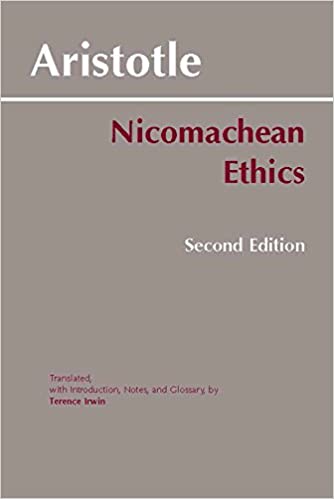Nicomachean Ethics

Overview
Why Philosophy?
Over the last few months, I’ve started reading some philosophy texts. This was largely related to feeling lost as I was deciding to quit my job—I didn’t know what I wanted to obtain for myself by quitting. I wasn’t sure what was important to me and what I should strive for.
Of course, that’s what philosophy tries to answer.
While there’s no way I could get a comprehensive understanding of philosophy before my decision to quit, I figured it would at least be an interesting thing to try to pursue over time. Hopefully the ideas would be helpful later on.
Aristotle
Anyways, I grabbed Nicomachean Ethics because it was the second book in this list. (I actually grabbed a different version since that one isn’t on Kindle.)
Aristotle is, famously, focused on really drilling into details. He constructs his arguments as if they’re mathematical proofs. This made him incredibly frustrating for me to read (and this is supposed to be one of his easier to read works).
In addition to his style, Aristotle was hard for me to read because I’m not sure the environment that he was writing in.
One, Aristotle wrote in Greek. Duh. This means that whatever you’re reading is a translation. I had to fight against my translation a lot—the wording quite often confused me.
Two, words. I’m not sure if Aristotle is defining new words or just trying to define a philosophical concept, but a large part of his writing is around defining what a concept is. So he’ll be talking about something like happiness (eudaimonia), and it’s a bit tricky to try to keep in mind (a) what the Greeks might have thought happiness was, (b) what Aristotle was defining as happiness, and © happiness as it’s known today.
Three, referencing other works. At times it seems like Aristotle assumes you’re familiar with then-contemporary works or ideas. You can read him without knowing these things (I didn’t know them), but I imagine it helps with certain sections.
Four, logic. It’s sometimes hard to follow the logic. There’s a mix of actual logic, analogy, and what seems to be commonly accepted knowledge/ideas at the time (such as ideas about the soul).
Recommendation
For most people, I would not recommend reading Aristotle. Definitely not on a whim. If you’re into (or trying to get into…) philosophy, then it’s probably something you’ll want to touch at some point.
Also, I didn’t even finish reading this book. I read 3 of the 10 sub-books, then finally gave up and read a summary to get a sense of the rest of the book. All of this was on-and-off over 2-3 months.
I found it incredibly helpful to not rely solely on my ability to understand Aristotle’s writing, especially given my translation. I regularly cross-referenced against this online, free translation. That was incredibly helpful.
I also discovered Stanford’s Encyclopedia of Philosophy, which helps to explain overall what Aristotle is saying.
An Unfairly Brief Summary
There’s a lot going on in the book—I can’t recall all of it and I probably can’t explain it well either. Plus, as mentioned, I didn’t even finish reading the book.
In a very brief nutshell, Aristotle’s interested in living a good life. He believes we do everything for the sake of some end, and that this is recursive—there is some “ultimate” end that we’re striving towards. He argues that the ultimate end is happiness: to pursue and attain happiness is to live a good life.
Happiness, however, isn’t what we think of it as today. In fact, there’s lots of different forms of happiness, some of which only apply under certain conditions. For example, if you’re sick, you’d be pretty happy to get better.
Aristotle argues that the happiness we should aim for is the happiness that comes from being virtuous. And you are virtuous when you act in a way that’s virtuous. This involves being able to recognize what is virtuous—Aristotle can’t define this, but he does give heuristics to determine what to do (roughly, avoid extremes).
Once recognized, the challenge is to then follow through with action—despite the pleasures or pains that make good choices challenging.